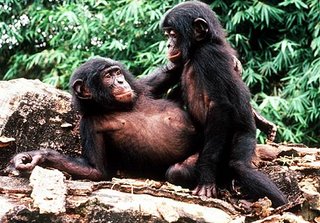 "Our early ancestors interbred with chimpanzees after the two species drew apart millions of years ago, a new paper suggests.
"Our early ancestors interbred with chimpanzees after the two species drew apart millions of years ago, a new paper suggests.The provocative idea is sketched by US genome experts, who have discovered that hominids and chimps diverged far more recently, and over a much longer timescale, than anyone had thought.
During this time, the authors theorise, the two primates were rather more than kissing cousins: they had sex, swapping genes before making a final separation."
"The ... analysis revealed big surprises, with major implications for human evolution," says Professor Eric Lander, director of the Broad Institute of Harvard University and the Massachusetts Institute of Technology, and co-author of the paper in today's issue of the journal Nature.
Until now, the belief was that humans and chimpanzees shared a common ancestor but went their separate ways around 6.5-7.4 million years ago. "
Genetically, chimpanzees are 98.5% identical to humans.
Looking at DNA
"Exploiting the mountain of data that has come from the human and chimpanzee genome projects, the researchers compared the genetic codes of the two species as they are today.
They believe that the two species made their split no later than 6.3 million years ago and probably less than 5.4 million years ago. In other words, around 1 to 2 million years earlier than the Toumai estimate.
Moreover, speciation of chimp and hominid, the process by which they emerged as separate species, took an extraordinary long time: around four million years in all."
Sex chromososmes
"Previous studies suggest that sex chromosomes are among the most vulnerable of chromosomes when it comes to interbreeding. This is because co-mingling places its genes under swift selective pressure.
Thus something unusual must have happened on the way to speciation: an initial split between human and chimp, followed by interbreeding, whose results show up in progressive younger genes, and then a final separation."
From: News in Science
No comments:
Post a Comment